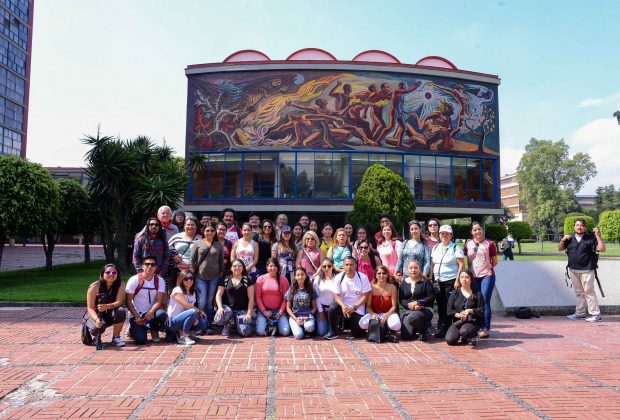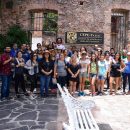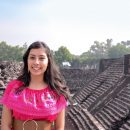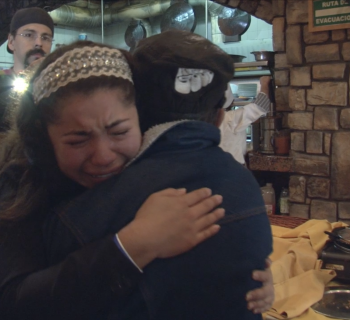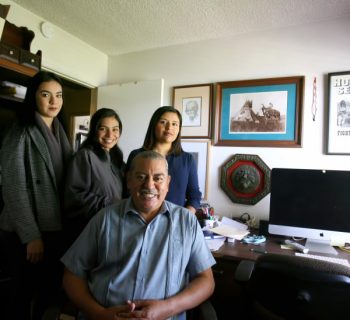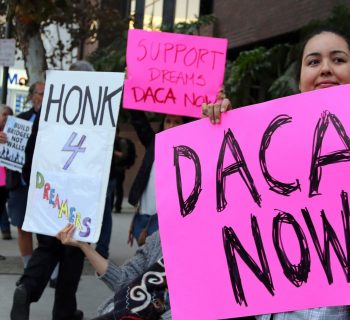LOS ANGELES, California.- When
Carla Martinez visited Mexico as part of the
California-Mexico Dreamers Study Abroad Program, the first thing she did upon arrival in the city of Lerdo, Durango, was to visit the grave of her grandmother who had just been buried in the city's cemetery, from where she called her undocumented mother in Los Angeles, California.
Carla Martinez, reconnects with her extended family in Lerdo Durango
Photo by: Carla Martinez
Carla, a California State University Northridge (CSUN) student, was finally able to return to the small community from which she and her family migrated while she was less than a year old.
Carla's study abroad experience could not have been possible if it wasn't because of her status under the Deferred action for childhood arrivals (DACA), the federal program that, for four years, has protected from deportation and given work permission to almost 800,000 undocumented people. DACA allows them to travel abroad under exceptional circumstances such as academic programs or because of a serious illness of a family member.
Her parents have not had the same luck. In mid-July, shortly before Carla traveled to Mexico as part of an academic program for dreamers, her maternal grandmother died of kidney cancer.
To be the connection between her mother and her grandmother's grave, she said, was the most difficult experience of her life.
"I knew that I was going to go to Mexico on behalf of my parents, that both of them were going to be there with me," she said.
Trapped in the United States
The students visit the campus of Universidad Nacional Autónoma de Mexico (UNAM)
Photo: Lidieth Arevalo
The 35 Dreamers that participated in the California-Mexico Studies Center's Summer 2016 Dreamers Study Abroad Program (totaling nearly 100 DACA-students in four years) had the chance to visit their families and their birthplace on behalf of their parents.
A study by the Pew Research Center shows that 21% of the undocumented immigrants living in the U.S. have lived in the U.S. for more than two decades. Furthermore, the average length of stay increased from 8 to 13 years between 2003 and 2013.
Yuritzi Galarza, another program participant, had not returned to Mexico in more than 12 years. She was a child when her family and her migrated to the U.S. from their native state of Mexico.
Like her companions, Yuritzi, 23, returned to California loaded with photos, videos, gifts, stories and hugs from relatives whom she did not know or had not seen in several years.
Yuritzi reunites with her grandmother and aunts after not seeing them for 12 years
Photo: Lidieth Arevalo
"It felt as if I was the eyes of my parents, because I was going to bring everything I was seeing. All I lived, all the emotions are conveyed through them," explained Yuritzi, who graduated from CSU Long Beach this Spring semester.
For her, the hardest part was accepting that time does not forgive as she reunited with her grandparents who are very sick.
Maturing in Mexico
Yuritzi was greatly moved by her visit to the village where she was born and spent his childhood. "It was only five days", but that was "enough to change [her] life," she said.
"I came to the village where we lived, where there is no electricity or water, things that I take for granted here [in Los Angeles]. I learned to value the things, my family and my parents did for me. I finally understood why they brought me to America, why they did not see a future for me in Mexico ".
Armando Vazquez-Ramos, CSULB professor and coordinator of the California-Mexico Dreamers Study Abroad Program, noted that most of these students return to California with another vision.
"I've seen year after year that these young people understand the sacrifice that their parents made in order for them to have a greater future. This experience brings them a greater sense of responsibility."
Carla Martinez, literately brought a little piece of her hometown Lerdo: a handful of soil from the grave of her maternal grandmother, with the idea of planting flowers with it.
"It's symbolic and gives me some peace, knowing that I not only brought some of Mexico, but a little of what's left of my grandmother," she said.
___
To read more articles about our California-Mexico Dreamers Study Abroad Program participants,
clicke here.
Second year launching of the Long Beach Ethnic Studies Program during the LBUSD Fall 2016 Semester.
Watch the program documentary:
LEADERSHIP AND LEGACY: THE LONG BEACH ETHNIC STUDIES PROGRAM
The documentary
Legacy and Leadership: The Long Beach Ethnic Studies Program (LB-ESP) features how the
LBUSD offers their students the opportunity to take tuition-free college credit Ethnic Studies courses while in High School. The Long Beach Ethnic Studies Program is a collaboration between the LBUSD and
CSU Long Beach, building upon the
Long Beach College Promise. The program offers 12 CSULB classes from 9am to 12noon on Saturdays at 6 of the LBUSD high schools, on Chicano and Latino Studies, Africana Studies, Asian American Studies and American Indian Studies.
The LB-ESP documentary is currently airing on the LBUSD's EdNews TV channel on the following days and times:
Un grupo de 33 jóvenes amparados bajo la Acción Diferida (DACA) regresó de un reciente viaje educativo a México con la satisfacción de haber retomado la conexión con sus raíces y su cultura.
Después de reconectarse con sus raíces y visitar distintos puntos de México durante tres semanas, 33 estudiantes indocumentados beneficiarios de
DACA arribaron al aeropuerto de Santa Ana en el condado de Orange con un mayor entendimiento de sí mismos.
Entre lágrimas, Yuritzii Galarza abrazó a su abuela en México después de 12 años de no verla. "Abuelita, ya llegué", Galarza, de 23 años, le dijo a su abuela mientras le daba un beso en la frente y la abrazaba bajo un llanto de alegría.
In adopting a sweeping package of gun control laws this summer, many California lawmakers focused on the sobering statistics - the large number of shootings that they say represent an "epidemic" of gun violence.
 Carla Martínez, a 'Dreamer' from Los Angeles, visits the archeological site "La Plaza de las Tres Culturas" in Mexico City
Carla Martínez, a 'Dreamer' from Los Angeles, visits the archeological site "La Plaza de las Tres Culturas" in Mexico City



